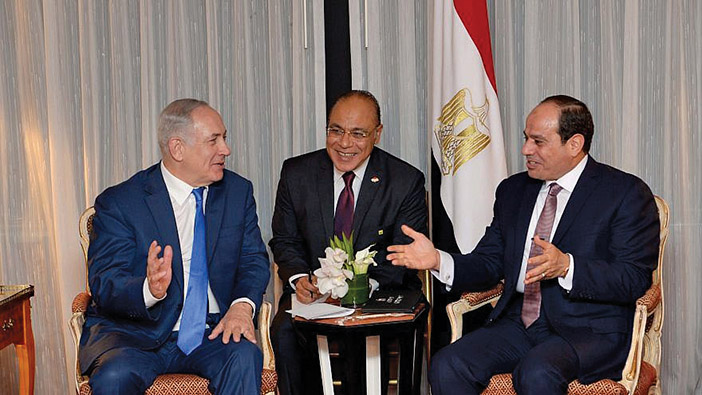
After a two-day lull in violence along the Gaza Strip-Israel border, the Los Angeles Times quoted a senior Israeli official as saying that a cease-fire agreement with Hamas, the Islamist organization that rules Gaza, is “virtually done.”
Following a spike in border violence last week, when Gaza terrorists fired some 180 projectiles at Israeli communities and Israeli airstrikes bombed dozens of Hamas terror targets in Gaza, Israel’s Defense Ministry said Monday that two days of “complete calm” on the border had led to possible easing of the closure of the Kerem Shalom commercial border crossing. At press time, it was reported that Israel has, in fact, allowed food and commercial goods to pass through the crossing into Gaza in an apparent easing of tensions.
On Tuesday, Finance Minister Moshe Kahlon confirmed a Channel 10 news report that Prime Minister Benjamin Netanyahu had met with Egyptian President Abdel-Fattah el-Sisi in Egypt in May to discuss a long-term cease-fire in the Gaza Strip.
Channel 10 said Netanyahu and el-Sisi discussed easing the Israeli-Egyptian blockade on Gaza, rehabilitating Gaza’s infrastructure and terms for a cease-fire between Israel and Hamas.
El-Sisi reportedly said that Israel, Arab states and the international community should press Palestinian Authority President Mahmoud Abbas to reassume control of Gaza.
Hamas ousted Abbas’ Fatah party from power in Gaza in a coup in June 2007, an event that dissolved the tenuous Palestinian unity government that had been in place since the 2006 Palestinian election, in which Hamas defeated Fatah.
The report also said the two leaders discussed the repatriation of the bodies of two fallen IDF soldiers and the release of two Israeli captives believed to be held in Gaza. They also discussed U.S. President Donald Trump’s much-anticipated plan for a peace agreement between Israel and the Palestinians, which has yet to be unveiled.
Speaking to Army Radio, Kahlon said he had known about the meeting and that “everything that happens in Gaza will be done with Egyptian mediation and involvement.”
Meanwhile, Israeli cabinet ministers are speaking up against the call for the Palestinian Authority to be restored to power in Gaza.
Intelligence Minister Yisrael Katz, a member of the diplomatic-security cabinet, told Israel Hayom, “Any attempt to restore Abbas to Gaza and connect Gaza to the Palestinian Authority in Judea and Samaria via a ‘secure corridor’ that will traverse Israel will present a direct threat to the security of Israel and the demographic balance between Israel and the Palestinians.
“It’s obvious that this matter must be discussed and decided by the cabinet. Israel must have a clear policy on Gaza, [of] separating the citizens of Gaza and Israel and drawing a clear security border between Israel and Gaza.”
Another Likud minister said, “Hamas will never forgo its control of Gaza, so proposals like this one are unrealistic.”
Other ministers noted that less than a year ago the cabinet rejected any possible contact between Israel and a Palestinian unity government that included Hamas. A unity government would have to be in place for the PA to retake control of the Gaza Strip.
In October 2017, the cabinet passed a decision that Israel would not conduct diplomatic negotiations with a Palestinian government of which Hamas was a part unless a number of conditions were met, including: Hamas must recognize Israel and stop its terrorist activity; Hamas must disarm; the bodies of fallen Israeli soldiers and the Israeli captives being held in Gaza must be returned; the PA must be placed in full charge of security in Gaza, including control of the border crossings and responsibility for preventing weapons smuggling; the PA must continue to eradicate Hamas terrorist infrastructure in Judea and Samaria; Hamas must cut ties with Iran; and humanitarian aid and supplies must be transferred to Gaza through the PA and the mechanisms established for that purpose.
By Israel Hayom Staff
and combined sources










